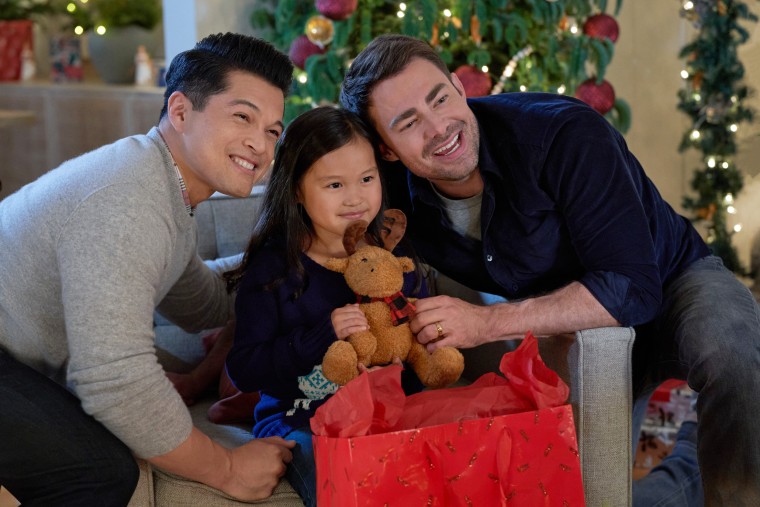A charming suburban couple welcomes a 6-year-old foster daughter on a joyous Christmas Eve. A successful New York lawyer and an ambitious Brooklyn photographer are set up on a blind date by their parents and fall in love, just in time to celebrate Christmas together. One might think that these movies — “Christmas on Cherry Lane” and “Friends and Family Christmas” — are exactly the sort of heartwarming, family-friendly holiday romances that conservative culture warriors would cheer.
But this year on the Hallmark Channel, there’s a plot twist: The main characters are gay. Christmas movies have dominated the family-friendly channel’s winter programming for nearly two decades, with millions of loyal viewers. Last year, Hallmark aired its first Christmas movie with gay central characters. This year, two new movies feature gay and lesbian leading characters. Other movies have supporting LGBTQ characters as well.
The right has attacked mammoth corporations like Budweiser and Target for daring to show support for LGBTQ Americans.
Hallmark’s move is not without risk: This year alone, Republicans introduced hundreds of anti-gay laws across the country, and the right has attacked mammoth corporations like Budweiser and Target for daring to show support for LGBTQ Americans. At The Washington Stand, the news site of the anti-LGBTQ Family Research Council, writer Suzanne Bowdey pines for the old Hallmark as “television’s home for clean, predictable, and endearing romance.” Bowdey notes the 2020 departure of former Hallmark parent company CEO Bill Abbott, who, “frustrated by the company’s decision to take Hallmark in a more progressive direction,” launched the Great American Family Network to counter this supposedly radical turn.
Bowdey seems intent on convincing her readers that it’s Hallmark that’s out of touch with middle American tastes, issuing warnings that other companies that have hopped on the “woke” bandwagon have faced backlash from consumers. Abbott’s new network has poached a number of Hallmark stars, including actress Candace Cameron Bure as the channel’s chief creative officer. Asked last year by The Wall Street Journal whether the new channel will feature same-sex couples, Bure said, “I think that Great American Family will keep traditional marriage at the core.”

But if 2023 was a terrible, demoralizing year of anti-LGBTQ backlash, “Christmas on Cherry Lane” is a touching homage to the progress on LGBTQ rights made over the past 50 years. The story, which is ham-fisted in every other way — it’s still a Hallmark movie after all — moves back and forth in time to depict three interconnected families and their Christmas Eve celebrations at 7 Cherry Lane in 1973, 1999 and 2023. In this fictional Anytown, USA, there are the barest allusions to social unrest. In 1973, the characters refer briefly to the oil crisis; in 1999 to the Y2K scare.
The 2023 storyline, though, is a winter wonderland of good cheer and acceptance. The 2023 owners of 7 Cherry Lane, Mike and Zian, have been together for five years and married for two. Mike is a high-stress chef at a local gastropub, and Zian his uxorious husband who is ever ready to talk or sing him down from his anxiety. When we meet them, it is the morning of Christmas Eve, their kitchen renovation is unfinished, and they are expecting a crowd of loved ones for dinner.
Mike manages his stress by hanging more Christmas decorations and singing “Silent Night” with Zian in the backyard. Mike wonders if they should abandon their dinner plans, given that the contractor has yet to finish hanging the cabinets and installing the countertops. Then — because it’s a Hallmark movie — the doorbell rings, and a social worker is there to tell them that not only have they been approved as foster parents, but a little girl is unexpectedly in immediate need of a foster home.
Mike is apprehensive about the abrupt timing. But Zian assures him, “We’ve been talking about how much we want to be dads since our first date,” and dashes off to furnish the child’s new bedroom. What follows is a series of “miracles” — their kitchen is finished faster than the speediest HGTV renovation, their foster daughter is delivered into their warm embrace, and their dinner guests arrive with good tidings and Christmas cheer.

There is no war on Christmas at 7 Cherry Lane, or in the New York City of “Friends and Family Christmas,” which revolves around the unexpected romance between Daniella and Amelia, whose overbearing parents push their reluctant daughters to meet for an awkward coffee date. The women pretend to be dating to get their meddling parents off their backs, but naturally end up falling in love. A smitten Daniella confesses to Amelia’s father at his law firm Christmas party that meeting his daughter was “an unexpected Christmas miracle.”
It is not hard to see how these plotlines would trigger the Christian right. In “Cherry Lane,” unlike in real life, there is no Christian child placement agency refusing to place a foster child with two dads, based on “religious freedom” claims. In “Friends and Family,” the pushy parents have never shipped their lesbian daughters off to conversion therapy. Instead, the families are their biggest cheerleaders for finding true love in the big city.
These portrayals are right in line with the views of a majority of Americans.
If, as People Magazine reports, Hallmark remains the “reigning leader in feel-good holiday flicks and rom-coms,” it’s because these portrayals are right in line with the views of a majority of Americans. More than 70 % of Americans support marriage equality. Eighty percent of Americans support nondiscrimination protections for LGBTQ people. And more than 6 in 10 Americans oppose laws like the one championed by Florida Gov. Ron DeSantis barring teachers from discussing sexual orientation and gender identity in public schools.
The Christian right’s domination of the GOP has ensured its persistent campaign against LGBTQ Americans in red state legislatures, based on demonizing lies about “groomers” seeking to upend “God’s design” for two genders. But when you’ve lost Hallmark, you’re definitely losing. The war the Christian right is waging is a political one, deploying a cruel tyranny of the minority, precisely because they have already lost the culture war. They’ve even lost that war in the land of Hallmark romances, over the heart and soul of the genre: the meaning of Christmas.